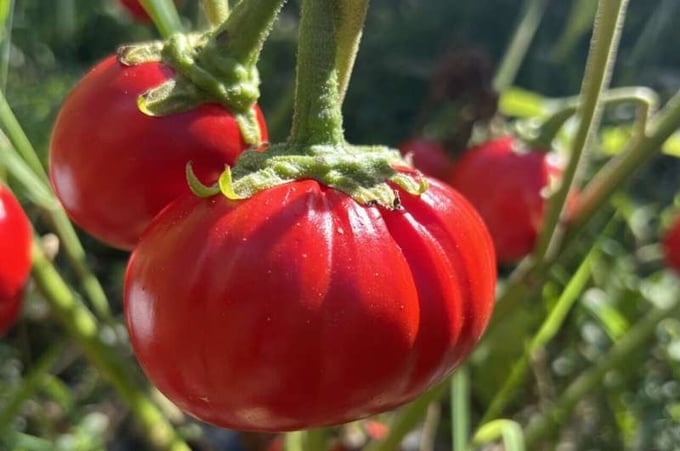October 19, 2025 | 00:09 GMT +7
October 19, 2025 | 00:09 GMT +7
Hotline: 0913.378.918
October 19, 2025 | 00:09 GMT +7
Hotline: 0913.378.918

Scientists used precise gene-editing to grow larger African eggplants. Credit: Zachary Lippman.
The research—led by teams at Johns Hopkins University and Cold Spring Harbor Laboratory—could lead to the development of new varieties of heirloom tomatoes and eggplants, including those that help support agriculture in areas around the world where local varieties are currently too small for large-scale production.
The findings are published in the journal Nature.
"Once you've done the gene editing, all it takes is one seed to start a revolution," said co-lead author Michael Schatz, a geneticist at Johns Hopkins University who worked on the Telomere-to-Telomere human genome project.
"With the right approvals, we could mail an engineered seed to Africa or anywhere it's needed and open up entirely new agricultural markets. There's huge potential to translate these advances into real-world impact."
The research is part of a larger effort to map the complete genomes of 22 crops in the nightshade genus, which includes tomatoes, potatoes, and eggplants.
Using computational analysis, the researchers compared the genome maps and traced how the genes evolved over time: more than half, the researchers found, had been duplicated at some point in the past.
"Over tens of millions of years, there's this constant churn of DNA sequences being added and lost," Schatz said.
"The same process can occur for gene sequences, where entire genes duplicate or disappear. When we started looking, we noticed these changes were very widespread, but we didn't yet know what those changes meant for the plants."
To find out, collaborators at the Boyce Thomson Institute used CRISPR-Cas9 gene-editing technology to tweak one or both duplicates of a gene, and collaborators at Cold Spring Harbor grew the engineered plants to see how the tweaks changed the mature plants.
The genetic duplicates, or paralogs, ended up being important for determining traits like flowering time, fruit size, and fruit shapes.
Turning off both copies of the CLV3 gene paralogs in the forest nightshade native to Australia, for example, resulted in plants that the researchers described as "weird, bubbly, disorganized" shapes—not viable to sell as produce in grocery stores. But careful editing of just one copy of CLV3 led to larger fruits.
"Having full genome sequences for these species is like having a new treasure map. We can see where and when one genetic path diverges from another and then explore that place in the genetic information where we wouldn't have thought to look," said Katharine Jenike, who assembled the genome sequences and was a Ph.D. student in Schatz's lab at the time of the research.
"They allowed us to find the size-genes in a really unexpected place."
In the African eggplant, a species grown across the African continent and in Brazil for its edible fruits and leaves, the researchers identified a gene, SaetSCPL25-like, that controls the number of seed cavities, or locules, inside the fruit. When they edited the SaetSCPL25-like genes in the tomato plant, the researchers found they could grow tomatoes with more locules: the more numerous the locules, the bigger the tomato.
The discovery could usher in a new era of tasty tomatoes, if done properly, the researchers said.
"This work shows the importance of studying many species together," Schatz said. "We leveraged decades of work in tomato genetics to rapidly advance African eggplants, and along the way we found entirely new genes in African eggplants that reciprocally advance tomatoes. We call this 'pan-genetics,' and it opens endless opportunities to bring many new fruits, foods, and flavors to dinner plates around the world."
(Phys.org)

(VAN) The legal framework for gene editing needs to strike a balance between promoting innovation, ensuring biosafety, and conserving biodiversity, while aligning with international commitments.

(VAN) MAE held a national conference to evaluate the outcomes of the One Commune One Product (OCOP) Program and rural tourism for the 2021–2025 period, and to outline sustainable development directions for 2026–2030.

(VAN) Experts in environmental sector have outlined 8 strategies for Vietnam to achieve its net-zero emissions goal by 2050.

(VAN) Acting Minister Tran Duc Thang emphasised that if Vietnam can effectively leverage the One Commune One Product (OCOP) program and rural tourism, the country will achieve a major breakthrough in rural development.

(VAN) The two countries agreed to develop a joint agricultural training program for 2025-2027, focusing on sustainable agriculture, food safety, green transition, and climate change adaptation.

(VAN) The export value of agricultural, forestry, and fishery products in the third quarter reached USD 18.47 billion, bringing the total for the first nine months to USD 52.31 billion, a 14% increase year-over-year.

(VAN) According to Director General Nguyen Tung Phong, digital transformation must start from forecasting, investment mindset, and operation management to the development and utilization of shared databases.